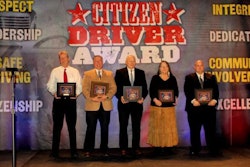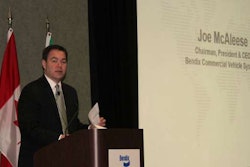Rep. Richard Hanna (R-N.Y.) sent a letter last week to U.S. DOT Secretary Anthony Foxx to air his concerns about the scope of and participants in the Federal Motor Carrier Safety Administration’s Congressionally required 34-hour restart study, which has been in the works since January.
New York Congressman Richar Hanna talks with former FMCSA Administrator Anne Ferro.Hanna’s letter includes four key points to Foxx and FMCSA that he says should be considered for the study, including — perhaps of most concern for the study’s efficacy — ensuring selection of drivers that “are truly representative of the industry,” Hanna writes.
The agency has focused on recruiting drivers who work between 60 and 70 hours a week and who typically work at night, Hanna says.
“This is concerning because it indicates the researchers do not understand how the 34-hour restart is being used in practice. This small [subset] of truck drivers is not representative of drivers who use the restart provision and not representative of drivers who have been impacted by the July 2013 restart restrictions,” he said in the letter.
The agency has been recruiting drivers for the study since January. The study, required by a 2015 appropriations law passed in December, was designed to pit pre- and post-2013 restart rules against one another. The bill directed the agency to study two groups of drivers — one that abided by the pre-July 2013 rules and one that operated under the 2013-implemented provisions.
Hanna has been one of the trucking industry’s main Congressional allies in pushing back against the 2013 rules, citing the agency’s lack of data and research in producing the rule and its perceived lack of benefits, especially when compared to its potential productivity restrictions.
In his April 2 letter to Foxx, Hanna also said the agency should examine in its study how many crashes or near crashes occur between morning rush hours of 5 a.m. and 9 a.m. This request stems from concerns from both within and outside of the industry that the 2013 HOS changes force more trucks on the road during those hours, which comes with a list of potential negatives: More traffic, more potential truck-involved crashes and forcing truck operators to burn allowed drive time stuck in rush hour traffic, to name a few.
Hanna also asks FMCSA to loop in the National Academies Transportation Research Board’s Committee on Truck and Bus Safety. The committee, he says, should be tasked with choosing the peer review team that will analyze the study. “This would show further commitment on behalf of the Department that objective analysis will occur,” Hanna says in the letter.
Lastly, Hanna asks FMCSA to limit its data analysis to restarts that include only one or two nights. As it stands, Hanna says, FMCSA is comparing restarts with one overnight period to those with more than two. “This is consistent with the previous flawed restart field study that was criticized by stakeholders,” he wrote. “If the research is indeed intended to study the relative benefits and drawbacks of the two rules, then restarts of more than two nights are not representative of the actual restart restrictions being studied.”
Hanna also said in his letter — repeating a point from a Congressional hearing earlier this year — he disagrees with the agency’s selection of the Virginia Tech Transportation Institute as the group to perform the research and produce the study. He said in February allowing VTTI to produce the study “is the definition of a conflict of interest.”










